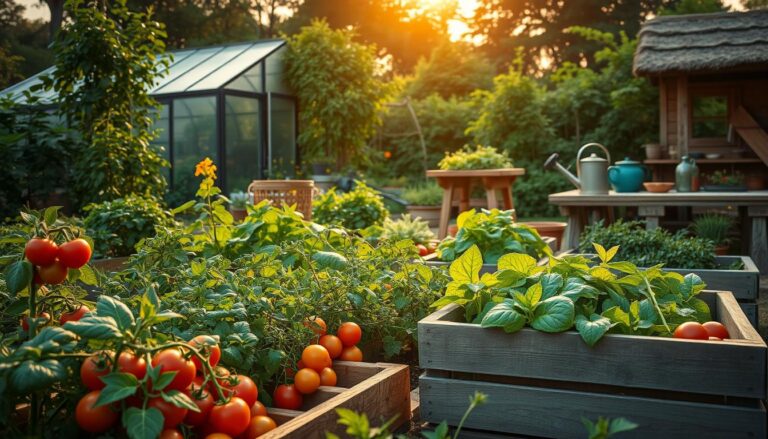Starting your organic gardening journey can be both exciting and overwhelming. With the right beginner gardening tools, you can set yourself up for success and enjoy a bountiful harvest.
Using the right equipment is crucial for organic gardening. It not only makes the process more efficient but also helps in maintaining the health and sustainability of your garden. As a new grower, investing in essential gardening tools will make a significant difference in your overall experience.
By choosing the best organic gardening tools for beginners, you’ll be well on your way to creating a thriving garden that brings joy and freshness to your life.
Why Proper Tools Matter for Organic Gardening Success
Embracing organic gardening for beginners means not only adopting a new method of growing plants but also understanding the role of quality tools in sustainable gardening. Organic gardening is about creating a balanced ecosystem that promotes healthy plant growth without relying on synthetic fertilizers or pesticides.
The Philosophy Behind Organic Growing
At its core, organic gardening is rooted in a philosophy that values sustainability and environmental stewardship. It’s about working with nature, not against it, to produce healthy, nutritious crops. This approach not only benefits the environment but also contributes to a healthier lifestyle for those consuming the produce.
How Quality Tools Enhance Garden Health
Using quality tools is essential for maintaining garden health. Tools that are well-made and appropriate for the task at hand reduce the risk of damaging plants and soil. For instance, a good garden fork can aerate the soil without causing undue disturbance to the roots.
Investing in quality tools also promotes sustainable gardening practices by reducing waste and the need for frequent replacements. Here’s a comparison of some common gardening tools and their sustainable alternatives:
| Tool | Conventional Option | Sustainable Alternative |
|---|---|---|
| Garden Fork | Cheap, flimsy materials | Durable, stainless steel |
| Garden Trowel | Plastic or thin metal | Solid, ergonomic design |
| Watering Can | Low-quality plastic | BPA-free, durable plastic or metal |
By choosing the right tools, gardeners can enhance their organic gardening experience, making it more efficient and enjoyable. For organic gardening for beginners, starting with a few essential, high-quality tools can make a significant difference in the success of their sustainable gardening endeavors.
Organic Gardening Tools for Beginners: The Essentials
For those new to organic gardening, having the essential tools is crucial for success. Starting with the right equipment not only makes the gardening process more enjoyable but also more productive.
Starting with the Basics
Every beginner’s journey into organic gardening starts with understanding the basic tools required. These include a garden trowel for planting, a rake for soil preparation, and a watering can for irrigation. Investing in quality beginner gardening tools from the outset can make a significant difference in the health and productivity of your garden.
Building Your First Tool Collection
Building your first tool collection can be both exciting and overwhelming. It’s essential to prioritize the tools that will be used most frequently. A good starting point is to focus on gardening equipment that serves multiple purposes, such as a hoe that can be used for weeding and cultivating soil.
Quality vs. Cost Considerations
When it comes to gardening tools, the debate between quality and cost is ongoing. While it’s tempting to opt for cheaper options, investing in higher-quality tools can be more cost-effective in the long run due to their durability and performance.
| Tool | Purpose | Quality Consideration |
|---|---|---|
| Garden Trowel | Planting and transplanting | Stainless steel for durability |
| Garden Rake | Soil preparation and leveling | Strong, rust-resistant materials |
| Watering Can | Irrigation | Durable plastic or metal |
By focusing on the essentials and considering both quality and cost, beginners can build a solid foundation for their organic gardening journey. The right gardening equipment not only enhances the gardening experience but also contributes to the overall success of the garden.
Hand Tools for Planting and Cultivation
The success of an organic garden heavily relies on the quality and appropriateness of hand tools used for planting and cultivation. These tools not only make the gardening process more efficient but also contribute to the overall health and productivity of the garden.
Garden Trowels and Dibbers
Garden trowels and dibbers are essential for planting seeds, seedlings, and bulbs. A good trowel should have a sturdy handle and a rust-resistant blade, while a dibber helps in making precise holes for seeds or seedlings, minimizing root disturbance.
Hand Cultivators and Weeders
Hand cultivators and weeders are vital for maintaining soil health and controlling weeds. These tools help in loosening the soil, improving aeration, and removing weeds without causing significant disturbance to the soil structure or nearby plants.
Hori Hori Knives and Multi-purpose Tools
Hori Hori knives, also known as weeding knives, are versatile tools used for weeding, cutting roots, and even digging. Their sharp, serrated edges make them highly effective for various gardening tasks, making them a valuable addition to any gardener’s toolkit.
When selecting hand tools, it’s essential to consider both quality and durability. Investing in good-quality tools may seem more expensive initially, but they last longer and perform better, ultimately saving time and effort in gardening tasks.
| Tool | Primary Use | Key Features to Look For |
|---|---|---|
| Garden Trowel | Planting seeds and seedlings | Rust-resistant blade, ergonomic handle |
| Dibber | Making precise holes for planting | Sharp point, comfortable grip |
| Hand Cultivator | Soil loosening and weeding | Durable tines, balanced design |
| Hori Hori Knife | Weeding, cutting roots, digging | Sharp, serrated edge, sturdy construction |
Soil Preparation and Management Tools
Soil health is crucial for organic gardening success, and the right tools make all the difference. Healthy soil is teeming with life and nutrients, providing a robust foundation for plants to grow. To achieve this, gardeners need the appropriate tools for soil preparation and management.
Garden Spades and Forks
Garden spades and forks are fundamental tools for any gardener. A spade is used for digging and turning over soil, while a fork is gentler on the soil, helping to aerate it without damaging its structure. When choosing between them, consider the type of soil you’re working with; for heavy clay soils, a fork might be more appropriate to avoid compaction.
Broadforks and No-Till Options
For those looking to minimize soil disturbance, broadforks are an excellent choice. They allow for deep aeration without turning the soil over, preserving the ecosystem within. No-till or reduced-till methods are gaining popularity among organic gardeners as they help maintain soil health and reduce erosion.
Soil Testing and Amendment Tools
Understanding your soil’s composition is vital. Soil testing kits can help determine pH levels and nutrient content. Based on these results, gardeners can then choose the appropriate amendments, such as compost or manure, to enhance soil fertility. Tools like compost turners can aid in the decomposition process, creating a nutrient-rich amendment for your garden.
By investing in the right soil preparation and management tools, organic gardeners can significantly improve their soil’s health and productivity, laying the groundwork for a bountiful harvest.
Watering Equipment for Sustainable Gardens
For new growers, selecting the appropriate watering equipment is key to a thriving sustainable garden. Effective watering systems not only conserve water but also ensure that plants receive the right amount of moisture for optimal growth.
When it comes to watering cans and hose attachments, there are various options available that can make watering easier and more efficient. Watering cans are ideal for small gardens or for targeting specific plants, while hose attachments can be used for larger areas or for more extensive watering needs.
Watering Cans and Hose Attachments
Watering cans allow for precise watering, reducing waste and ensuring that plants receive the water they need. Hose attachments, such as spray nozzles, can be adjusted to different settings, making them versatile for various watering tasks.
Drip Irrigation Systems for Beginners
Drip irrigation systems are highly efficient, delivering water directly to the roots of plants, thus minimizing evaporation and runoff. For beginners, starter kits are available that include everything needed to set up a basic drip irrigation system.
Rain Barrels and Water Conservation Tools
Using rain barrels is another effective way to conserve water. By collecting rainwater, gardeners can reduce their reliance on municipal water supplies, lowering their water bills and contributing to sustainable gardening practices.
In conclusion, choosing the right watering equipment is crucial for maintaining a healthy and sustainable garden. By considering options like watering cans, drip irrigation systems, and rain barrels, new growers can make informed decisions that support their gardening goals.
Composting and Mulching Essentials
Composting and mulching are fundamental practices in organic gardening, enhancing soil fertility and structure. These processes not only reduce waste but also create a nutrient-rich environment for plants to thrive. By understanding the essential tools for composting and mulching, gardeners can improve their soil’s health and productivity.
Compost Bins and Tumblers
Compost bins and tumblers are crucial for containing and managing compost piles. Bins come in various sizes and materials, from plastic to wood, offering options for different garden sizes and preferences. Tumblers, on the other hand, make it easier to turn the compost, speeding up the decomposition process.
Key Features to Consider:
- Size and capacity
- Material durability
- Ease of turning or accessing the compost
Compost Aerators and Thermometers
Compost aerators are tools used to turn and aerate the compost pile, ensuring it decomposes efficiently. Aerators can be manual or mechanical. Compost thermometers help monitor the temperature inside the compost pile, which is crucial for maintaining optimal decomposition conditions.
Did you know? The ideal temperature for composting is between 130°F and 140°F, indicating active decomposition.
Mulch Forks and Spreaders
Mulch forks are designed for gently turning and aerating mulch, while mulch spreaders help distribute it evenly across the garden bed. These tools are essential for maintaining a uniform layer of mulch, which helps retain moisture and suppress weeds.
| Tool | Function | Benefit |
|---|---|---|
| Mulch Fork | Aerating and turning mulch | Prevents matting, ensures airflow |
| Mulch Spreader | Distributing mulch evenly | Uniform coverage, reduced waste |
By incorporating these composting and mulching essentials into their gardening routine, organic gardeners can significantly improve their soil’s health and overall garden productivity.
Organic Pest Management Solutions
For new growers, understanding organic pest management solutions is vital for a successful harvest. Organic gardening isn’t just about growing plants without chemicals; it’s about creating a balanced ecosystem where plants, insects, and microorganisms coexist harmoniously.
“The best way to keep pests in check is to have a healthy, diverse garden ecosystem,” says a renowned organic gardening expert. This approach not only reduces the reliance on pesticides but also fosters a more resilient garden.
Non-Toxic Sprayers and Applicators
One of the key tools in organic pest management is the use of non-toxic sprayers and applicators. These tools allow gardeners to apply natural pest control solutions effectively. For instance, sprayers can be used to apply neem oil or insecticidal soap, which are effective against a wide range of pests.
Row Covers and Physical Barriers
Row covers and other physical barriers are another effective method for managing pests organically. These barriers prevent pests from reaching plants, thereby reducing damage. Row covers can be particularly effective against flying insects and can also help in controlling soil-borne diseases by preventing pests from emerging.
- Row covers: Lightweight, porous fabrics that allow light and water to reach plants while keeping pests away.
- Copper tape: Slugs and snails detest crossing over copper, making it an effective barrier.
- Fine mesh: Keeps out tiny insects and pests.
Beneficial Insect Habitats and Attractors
Attracting beneficial insects is a cornerstone of organic pest management. By creating habitats for these beneficial insects, gardeners can naturally control pest populations. Planting a diverse range of flowers, herbs, and vegetables can attract beneficial insects like ladybugs and lacewings, which prey on common garden pests.
For example, planting marigolds can attract beneficial nematodes that attack pest larvae, while basil can repel aphids and other pests. Creating a welcoming environment for these beneficial insects is a sustainable and effective way to manage pests in an organic garden.
Harvesting and Garden Maintenance Equipment
Harvesting and maintaining your organic garden requires a set of specialized tools that ensure the health and productivity of your plants. Effective harvesting tools not only make the process easier but also help in preserving the quality of the produce. Moreover, proper garden maintenance equipment is crucial for the ongoing health of your garden.
Harvest Baskets and Garden Bags
When it comes to harvesting, having the right containers is essential. Harvest baskets and Garden bags are designed to gently hold your produce, minimizing damage and making collection easier. Look for baskets and bags made from durable, breathable materials that can withstand regular use.
Pruning Shears and Garden Scissors
Pruning shears are a critical tool for maintaining plant health by allowing for precise cutting and trimming. Similarly, Garden scissors are handy for more delicate tasks. Both tools help in controlling plant growth, removing diseased parts, and encouraging better yields.
Garden Carts and Wheelbarrows
Garden carts and Wheelbarrows are indispensable for transporting plants, soil, and other gardening supplies around the garden. They reduce strain and increase efficiency, making garden maintenance less daunting. Choose models that are sturdy and have good maneuverability.
By incorporating these harvesting and garden maintenance tools into your gardening routine, you’ll be able to enjoy a more productive and healthier organic garden.
“Gardening is a love song, a duet between a human being and Mother Nature.”
Tool Care and Storage for Longevity
The longevity of your gardening equipment depends on how well you maintain and store it. Proper tool care not only extends the life of your tools but also ensures they remain effective and safe to use.
Cleaning and Sanitizing Organic Garden Tools
Regular cleaning and sanitizing of your gardening tools are crucial. Use a mixture of soap and water to clean off dirt, and then sanitize with a solution of one part bleach to nine parts water to prevent the spread of diseases. Dry your tools thoroughly after cleaning to prevent rust.
Proper Storage Solutions
Store your tools in a dry, organized manner. Use hooks, bins, or a tool shed to keep them off the ground and protected from the elements. Labeling your storage can also help you quickly find the tool you need.
Seasonal Maintenance Tips
At the end of each gardening season, inspect your tools for damage or wear. Sharpen cutting tools, replace worn-out handles, and apply a rust-inhibiting coating to metal parts. Regular maintenance will keep your tools in good condition and ready for the next gardening season.
Conclusion: Growing Your Garden and Tool Collection Together
Embarking on an organic gardening journey can be a rewarding experience, and having the right tools is essential for success. As we’ve explored, starting with the basics and gradually expanding your collection is key to creating a thriving garden.
By investing in quality organic gardening tools for beginners, you’ll be better equipped to maintain a healthy and sustainable garden. Remember, your tool collection will grow alongside your garden, and being mindful of your needs will help you make informed decisions along the way.
As you continue on your gardening journey, don’t be afraid to try new techniques, experiment with different tools, and learn from your experiences. With patience, practice, and the right equipment, you’ll be well on your way to enjoying the many benefits of organic gardening.
FAQ
What are the essential tools for organic gardening?
How do I choose the right gardening tools for my needs?
What is the importance of soil testing in organic gardening?
How can I conserve water in my organic garden?
What are some effective organic pest management solutions?
How do I care for and store my gardening tools?
What are the benefits of composting in organic gardening?
How can I maintain my garden’s health and productivity?

Sortemdia nasceu com o propósito de trazer alegria e oportunidades para todos por meio de sorteios gratuitos de prêmios incríveis. O site tem como missão oferecer experiências acessíveis, divertidas e justas para quem deseja concorrer a produtos, serviços e brindes sem pagar nada por isso. Acreditamos que a sorte pode bater à porta de qualquer pessoa — e no Sortemdia, ela pode chegar com apenas um clique.



